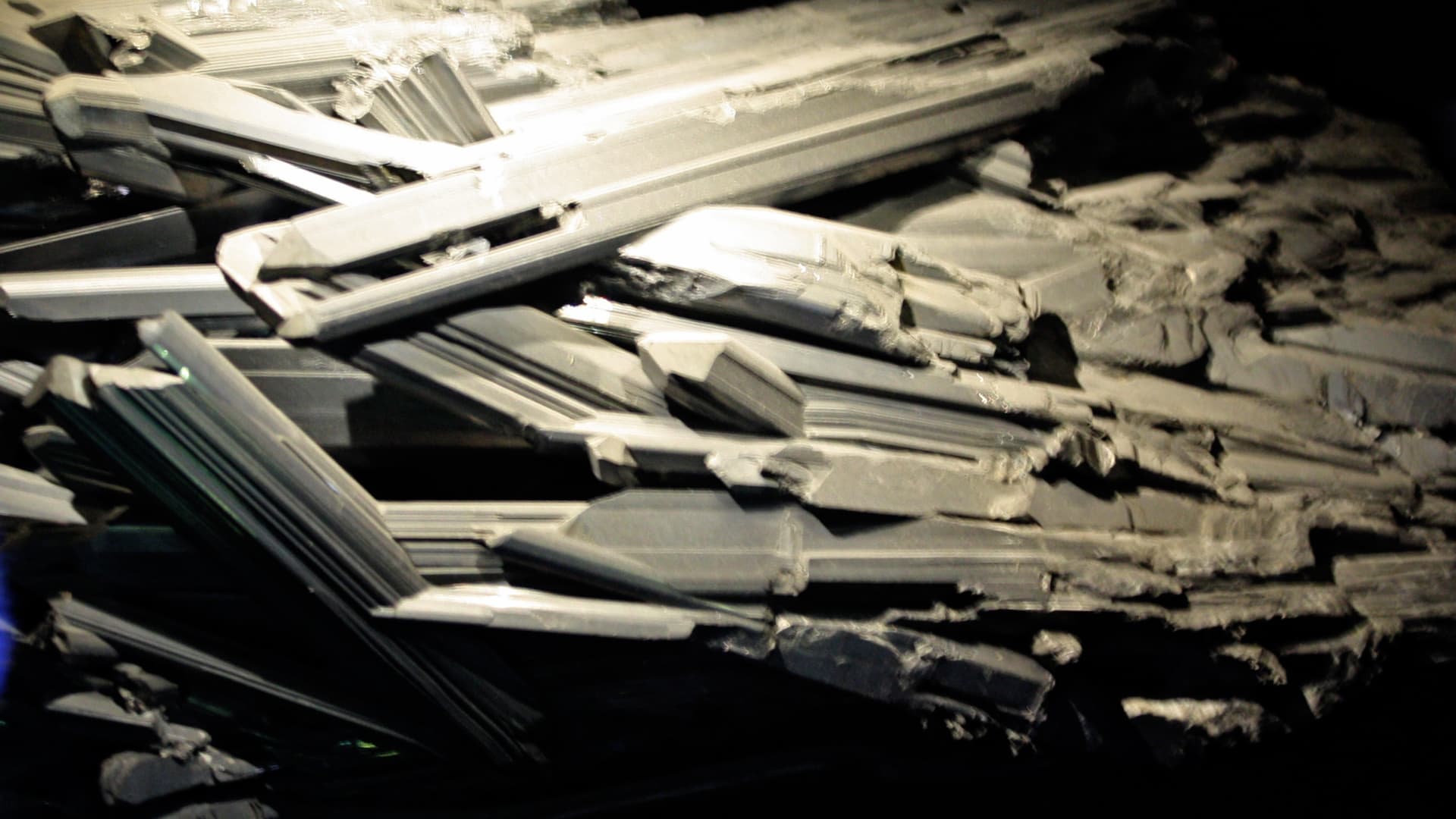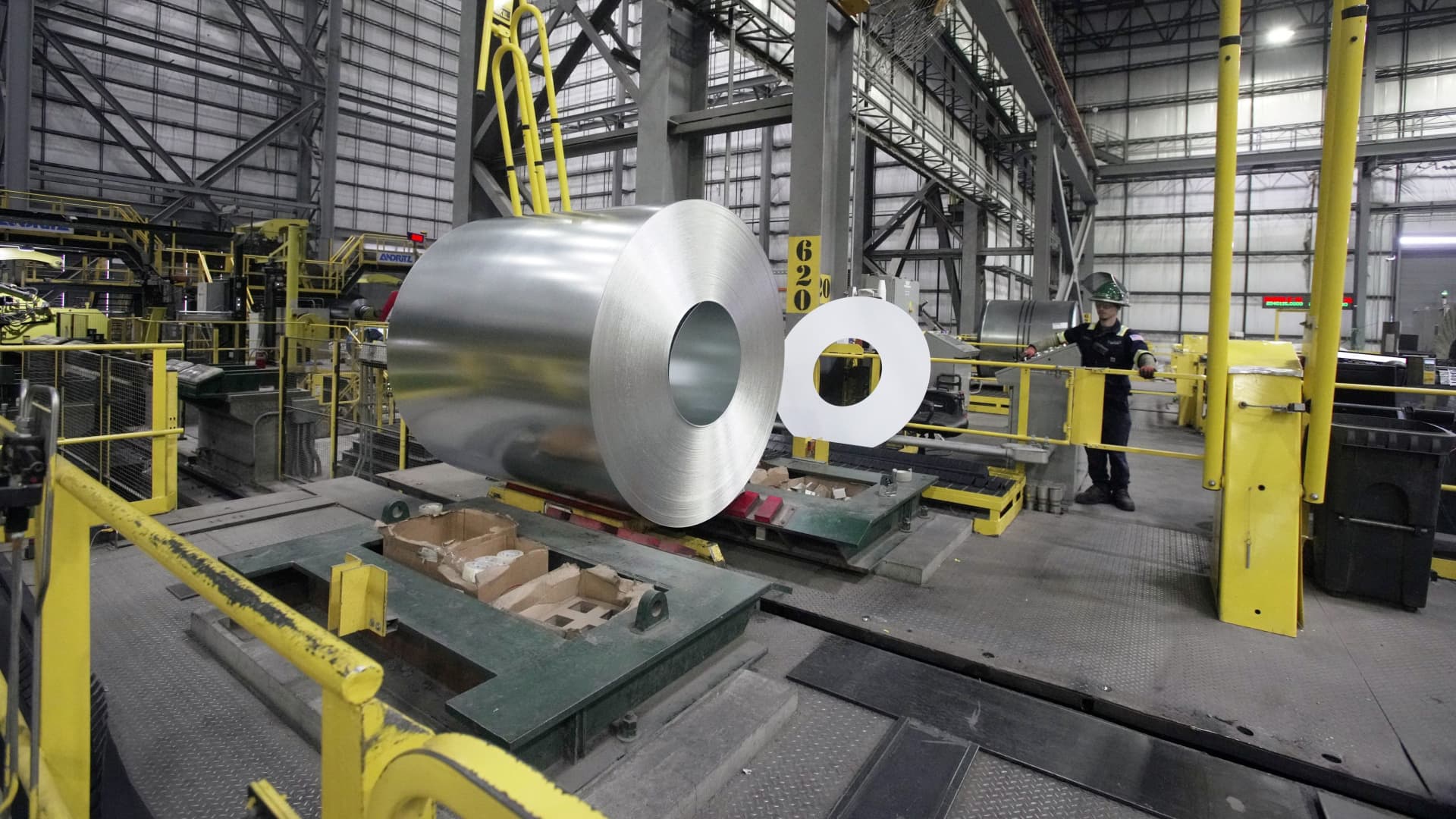Pictured are are crystals of the antimony ore stibnite (antimony sulphide).
Universalimagesgroup | Universal Images Group | Getty Images
BEIJING — China’s latest export controls has rattled insiders of the critical minerals industry, and some are concerned that Beijing will leverage its global supply chain dominance in unprecedented ways.
China’s Ministry of Commerce announced Thursday that export controls on antimony would take effect Sept. 15. Antimony is used in bullets, nuclear weapons production and lead-acid batteries. It can also strengthen other metals.
“Three months ago, there’s no way [any] one would have thought they would have done this. It’s quite confrontational in that regard,” Lewis Black, CEO of Canada-based Almonty Industries, said in a phone interview. The company has said it’s spending at least $125 million to reopen a tungsten mine in South Korea later this year.
Tungsten is nearly as hard as a diamond, and used in weapons, semiconductors and industrial cutting machines. Both tungsten and antimony are on the U.S. critical minerals list, and less than 10 elements away from each other on the periodic table.
“My sector is now thinking this is getting much closer to home than graphite,” Black said, referring to China’s previous export controls. Last year, Beijing, the world’s largest graphite producer, said it would enforce export permits for the crucial battery material amid scrutiny from foreign countries worried about its dominance.
“I can’t explain this move and I think that’s what rattled a lot of people in this sector, my customers, and they don’t have a plan B, which China is very aware of. There hasn’t been one for 30 years,” he said.
“There’s always been an equilibrium … they were never weaponized because they could create this snowball of escalation,” he said.
China accounted for 48% of global antimony mine production in 2023, while the U.S. did not mine any marketable antimony, according to the U.S. Geological Survey’s latest annual report. The U.S. has not commercially mined tungsten since 2015, and China dominates global tungsten supply, the report said.
“I think it’s the start of some export restrictions in a number of rare earths, minerals,” Tony Adock, executive chair of Tungsten Metals Group, said in a phone interview. He said he found it hard to believe that China would just restrict antimony.
“The way that the [Chinese Commerce Ministry] statement was written, we’ve extrapolated that to tungsten and other rare earths. It may not happen,” Adock said, noting that “tungsten is probably the highest economic importance.”
China’s Ministry of Commerce did not immediately respond to a request for comment.
Tungsten’s military importance
The U.S. has sought to restrict China’s access to high-end semiconductors, following which Beijing announced export controls on germanium and gallium, two metals used in chipmaking.
While tungsten is also used to make semiconductors, the metal, like antimony, is used in defense production.
“China has a declining tungsten production, but tungsten is absolutely vital, far more than antimony, in military applications,” said Christopher Ecclestone, principal and mining strategist at Hallgarten & Company.
He expects China will put export controls on tungsten by the end of the year, if not in the next month or two.
“During a situation where there’s a bit of a race to secure metals in case there is some sort of flare up in tensions, frankly we talk about South China Sea or Taiwan, you want to have as much tungsten as you can,” Ecclestone said. “But you also want people on the other side to have as least tungsten as you can engineer.”
The U.S. is already keen to reduce its reliance on China for tungsten.
Starting in 2026, the U.S. REEShore Act prohibits the use of Chinese tungsten in military equipment. That refers to the Restoring Essential Energy and Security Holdings Onshore for Rare Earths Act of 2022.
The House Select Committee on the Strategic Competition between the United States and the Chinese Communist Party in June announced a new working group on the U.S. critical minerals policy.
Ecclestone said that last week, the niche market of antimony trading noticed that the U.S. price for buying the metal from Rotterdam was exponentially higher than the price for delivery out of Shanghai. That’s after antimony prices kept rising even after pandemic-related shipping disruptions ended, he said.
“There’s a suspicion that the Pentagon has been re-stuffing its reserves of certain metals, and most notably antimony because it needs antimony for munitions,” said Ecclestone, who founded the mining strategy firm in 2003.
The U.S. Department of Defense did not immediately respond to a request for comment.
China is acting more in retaliation “against what it views as an intrusion into its national interests,” Markus Herrmann Chen, co-founder and managing director of China Macro Group, said in an email.
He pointed out that China’s Third Plenum meeting of policymakers in July “put forward a completely new policy goal of better coordinating the entire minerals value chain, likely reflecting the further heightened supply importance of ‘strategic mineral resources’ for both business and geoeconomic interests.”
Emerging alternatives
As China seeks to ensure its national security, companies in the U.S. and elsewhere are looking to tap a nascent opportunity.
“Energy Fuels has been the largest supplier of uranium oxide to the U.S. for several years supporting domestic nuclear energy production,” Mark Chalmers, president and CEO of Colorado-based Energy Fuels, said in a statement. He said the company is creating a U.S. rare earths product line.
“We recognized that our 40-year expertise working in naturally radioactive materials give us a competitive advantage to duplicate China’s success separating multiple [rare earth elements] from low-cost and plentiful monazite,” Chalmers said, referring to a mineral from which the desired metals can be extracted.
It remains unclear whether China will follow through with a blanket implementation of the latest export controls.
“They don’t want to acknowledge that this could escalate,” Black said. “But I don’t think China wants this to escalate either. The last thing you want to create is another boogey man [at] the beginning of a U.S. election. Let’s see in a week whether this is really a policy or not.”

 Personal Finance1 week ago
Personal Finance1 week ago
 Blog Post1 week ago
Blog Post1 week ago
 Economics6 days ago
Economics6 days ago
 Economics1 week ago
Economics1 week ago
 Accounting6 days ago
Accounting6 days ago
 Personal Finance1 week ago
Personal Finance1 week ago
 Economics6 days ago
Economics6 days ago
 Personal Finance6 days ago
Personal Finance6 days ago










